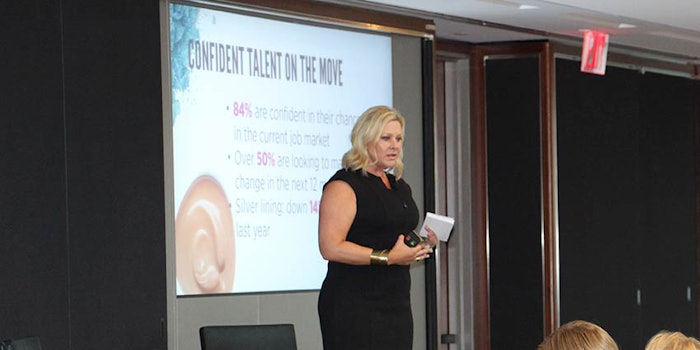
During a recent CEW event in New York, Lisa Marie Ringus, executive vice president, global sales and business development at 24 Seven Inc., discussed beauty industry salary norms, sought-after skill sets and the general state of employment. (Read Ringus' insights from the 2015 market here.)
Recently, Ringus spoke to Global Cosmetic Industry (GCI) about the beauty industry jobs landscape and the trends defining the environment.
GCI: Employees changing jobs are seeking pay increases, which don't seem to be materializing in the 11% range. However, employees will give ground on pay in exchange for "time." Are employers responding to that with packages that mix modest pay bumps and time off?
LMR: Candidates have become a lot more savvy in terms of negotiating their fringe benefits. If they know it is a smaller, growing company gaining traction, they will look to off-set lack of base salary with equity to cash-in if the company sells to a larger conglomerate.
We have seen a few of these acquisitions happen that have created a lot of buzz around the equity piece. There are also some great beauty startups disrupting the market place with their flexible schedules, work-from-home options, fully covered benefits, unlimited vacation days, and pet friendly environments that are also attractive options to candidates than their monetary compensation.
"...the onus is on companies to make their employment brand a magnet by providing the right balance of compensation, career development and culture..."
GCI: Conversely, is the lack of significant pay bumps causing beauty professionals to stay put?
LMR: If the new job offers opportunity to develop and grow professionally, job candidates will consider a modest increase to make a move. However, if the job is a lateral move in terms of responsibility and skill set, a highly qualified candidate is less likely to make the jump if the money isn't there.
GCI: Generally, is it a buyers (employers) or sellers (employees) market?
LMR: It's definitely an employee's market—especially in the hard to recruit areas of sales, marketing and digital/interactive. The most desired candidates can be picky about job offers, and often have multiple employment choices.
In this kind of candidate-driven market, the onus is on companies to make their employment brand a magnet by providing the right balance of compensation, career development and culture that will attract discerning, top talent.
"Transparency is something that is simple but makes a huge impact on the culture."
GCI: A lack of a meaningful company culture appears to be at the center of the employee satisfaction crisis. What is your advice to companies in terms of building a culture that retains and attracts the best of the best? What are they doing wrong, currently, and what concrete steps can they take to become more attractive?
LMR: Job candidates—especially millennials—are looking for authentic/transparent companies that provide exposure to executives, are family-friendly, and progressive in terms of their approaches to motivating and retaining employees. Candidates are growing averse to rigid, KPI-driven environments that do not foster creativity and only focus on the bottom line.
They also shy away from companies that do not embrace and support employees as they move through life stages or face life milestones—like starting a family, juggling family, caring for elderly parents or sick partners.
Of course every company is bottom-line-driven but the most desirable company cultures are the ones that include their employees in the economic mission—employees want to understand how strategy evolves, and don’t want to work for a company where the culture is that decisions are made behind closed doors. Transparency is something that is simple but makes a huge impact on the culture.










